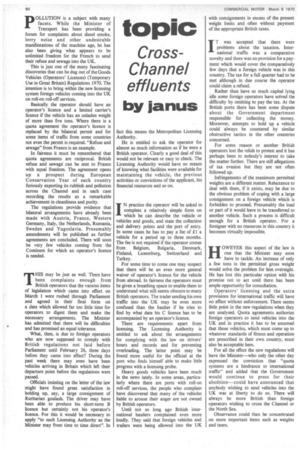topic
Page 92

If you've noticed an error in this article please click here to report it so we can fix it.
Cross
Channel effluents
by janus
fact this means the Metropolitan Licensing Authority.
He is entitled to ask the operator for almost as much information as if he were a British operator. Clearly a good deal of this would not be relevant or easy to check. The Licensing Authority would have no means of knowing what facilities were available for maintaining the vehicle, the previous activities or convictions of the applicant, his financial resources and so on.
IN practice the operator will be asked to complete a relatively simple form on which he can describe the vehicle or vehicles and goods, and state the collection and delivery points and the port of entry. In some cases he has to pay a fee of £1 a vehicle for a period up to three months. The fee is not required if the operator comes from Belgium, Bulgaria, Denmark, Finland, Luxemburg, Switzerland and Turkey.
For some time to come one may suspect that there will be an even more general waiver of operator's licence for the vehicle from abroad. In fairness the operators must be given a breathing space to enable them to understand what still seems obscure to many British operators. The trader sending his own traffic into the UK may be even more confused than the haulier if he tries to find by what date his C licence has to be accompanied by an operator's licence.
There are requirements apart from licensing. The Licensing Authority is entitled to ask about the arrangements for complying with the law on drivers' hours and records and for preventing overloading. The latter point may be found more useful for the official at the port who finds himself able to make little progress with a licensing probe.
Heavy goods vehicles have been much in the news lately. In some areas, particularly where there are ports with roll-on roll-off services, the people who complain have discovered that many of the vehicles liable to arouse their anger are not owned by British operators.
Until not so long ago British• international hauliers complained even more loudly. They said that foreign vehicles and trailers were being allowed into the UK with consignments in excess of the present weight limits and often without payment of the appropriate British taxes.
IT was accepted that there were problems about the taxation. International traffic was a comparative novelty and there was no provision for a payment which would cover the comparatively few days that a foreign vehicle was in this country. The tax for a full quarter had to be met although in due course the operator could claim a refund.
Rather than have so much capital lying idle some foreign operators have solved the difficulty by omitting to pay the tax. At the British ports there has been some dispute about the Government department responsible for collecting the money. Moreover, attempts to hold up a vehicle could always be countered by similar obstructive tactics in the other countries concerned.
For some reason or another British operators lost the relish to protest and it has perhaps been to nobody's interest to take the matter further. There are still allegations of tax evasion but they are not often followed up.
Infringements of the maximum permitted weights are a different matter. Reluctance to deal with them, if it exists, may be due to the obvious problem of coping with a large consignment on a foreign vehicle which is forbidden to proceed. Presumably the load or part of it would have to be transferred to another vehicle. Such a process is difficult enough for a British operator. For a foreigner with no resources in this country it becomes virtually impossible.
H°WEYER this aspect of the law is one that the Minister may soon have to tackle. An increase of only a few tons in the permitted gross weight would solve the problem for him overnight. He has lost this particular option with his promise not to act until there has been ample opportunity for consultation.
Operators' licensing and the extra provisions for international traffic will have no effect without enforcement. There seems little point in the new regulations when they are analysed. Quota agreements authorize foreign operators to send vehicles into the UK and in practice it has to be assumed that those vehicles, which must come up to whatever standards of fitness and operation are prescribed in their own country, must also be acceptable here.
For all the effect the new regulations will have the Minister—who only the other day expressed the conviction that "quota systems are a hindrance to international traffic" and added that the Government would continue to press for their abolition—could have announced that anybody wishing to send vehicles into the UK was at liberty to do so. There will always be more British than foreign operators wishing to cross the Channel or the North Sea.
Observance could then be concentrated on more important items such as weights and taxes.




























































































































































